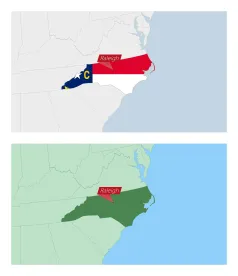North Carolina statutes permit State agencies and local governments (the "government") to use alternatives to traditional bid-build approaches to construction.
Two popular options are construction manager at risk and design-build delivery methods. The North Carolina General Statutes set out the method the government must use in determining the winning bid.
However, many public building projects use at least some federal dollars. And there are strings attached to the federal funds. The most important federal requirement is that the construction project's procurement process must comply with the federal rules, commonly called the Uniform Guidance.
The problem? State procurement law and the Uniform Guidance can be inconsistent and, at times, mutually exclusive.
Take the design-build process, for example.
North Carolina law has historically disfavored the design-build delivery method. In fact, this method was generally not permissible on North Carolina public projects until 2013. Despite the fact that the design-build delivery method is often cheaper and quicker than other methods, some governments see it as a newer delivery method and is, thus, deemed risky. Also, its unique nature requires multiple licensed professionals (general contractors, architects, and engineers) to walk the fine line between working together and not engaging in unlicensed practice of a profession. For example, general contractors must be careful not to act like unlicensed architects. This intricate dance was discussed in our previous article.
Federal Dollars: Intended to Make Things Better, but…
Public projects that spend federal dollars are required to follow federal regulations, commonly called the "Uniform Guidance" (primarily located in Part 200 of Title 2 of the Code of Federal Regulations), plus North Carolina law. This is the case for all public projects, not just those that utilize the design-build delivery method. However, because North Carolina has enacted laws that are unique to the design-build delivery method, they do not always align with the Uniform Guidance.
In some cases, the Uniform Guidance takes an opposite direction compared to North Carolina's statutes. This is most prevalent in the selection phase of design-build contract procurement.
Under North Carolina law, when the government solicits bids for a design-build contract, it is required to select firms that are qualified to perform under a design-build contract with "demonstrated competence and qualification." Notably, the government must analyze the bidders "without regard to fee." Once the winning bid has been selected, the entity will only then negotiate a contract with the winning firm at "a fair and reasonable fee."
The Uniform Guidance allows entities to solicit either (1) sealed bids or (2) proposals. But, regardless of which method the government entity chooses, the entity is required to use price to determine the winning bid. If the entity uses sealed bids, it must award the contract to the "responsible bidder whose bid . . . is the lowest in price." If the entity solicits proposals, it must award the contract to the "the responsible offeror whose proposal is most advantageous to the non–Federal entity, with price and other factors considered." 2 C.F.R. § 200.320(b)(2)(iii).
In North Carolina, however, the government has not been able to use price as a selection factor when procuring architectural or engineering services. For years, the government simply could not use the Uniform Guidance's procedures to procure design-build services. The federal requirement that selection of design-build services be determined based on price, while North Carolina says that price cannot be a factor, means that the government cannot procure design-build services when using money subject to the Uniform Guidance. This complication was just something North Carolina procurement officials and their attorneys came to accept and live with.
Then Congress appropriated an unprecedented amount of money for infrastructure during the coronavirus pandemic. And that money had to be spent relatively quickly.
A Temporary Solution
Massive federal dollars plus the need for speed made design-build especially attractive to the government. The tension between the Uniform Guidance and state law made many government attorneys and project managers reject the design-build procurement option.
But, some said, "there must be a solution." Perhaps Congress could change the Uniform Guidance to match North Carolina? That idea was simply too complicated and would take too long. The other option was more doable: Change the North Carolina General Statutes. And that's what happened.
To help rectify these inconsistencies, the North Carolina General Assembly enacted Session Law 2021-189. Section 5.17.(a) of that law removes the requirement that price cannot be a factor in selecting the winning bid. Under the session law, government entities now have the option to "select and commence contract negotiations with the design-builder whose response is ranked most advantageous" to the government entity, the determination of which can include price.
While this certainly helps to bridge the gap between federal procurement laws and state design-build procurement laws, it is set to expire in December 2025. It remains to be seen how the legislature will address its expiration. However, the need to better align our state statutes with the Uniform Guidance is clearly, and rightfully, something contractors, government attorneys, and legislators should confront.
Conclusion: Stay Tuned
In conclusion, federal dollars can benefit public construction projects. But government owners, engineers, architects, and contractors must watch out for the interplay between the Uniform Guidance and state law. The North Carolina General Assembly has temporarily allowed state law to match up with the Uniform Guidance for design-build procurement procedures. But when the special permission sunsets in 2025, we will be back to the pre-pandemic problem. Perhaps now is a good time for legislators to permanently bring North Carolina law into line with the Uniform Guidance.





 />i
/>i

